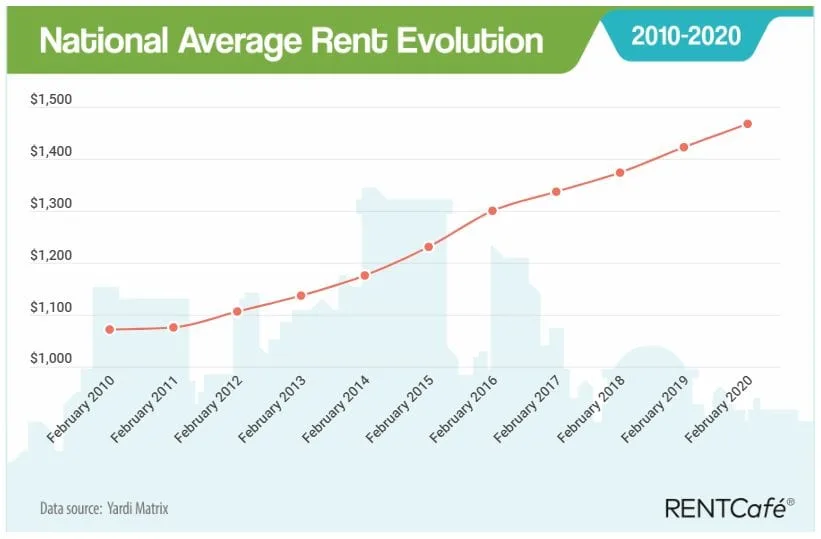With the highest average rent rates ever recorded at $1,463 this year, paying rent in the United States is becoming a problem for the 109 million+ renters in the country.
Why is rent so high? There is a slew of factors that create the problem of rising rent. Keep reading to find out why rent is so high – and why it’s likely only going up from here.
Why Is Rent So High?

Image Source: Rentcafe.com
Wondering why rent is so high? You’re not alone. It may seem like your landlord is simply greedy, but that’s not true. In fact, there are a few factors at work across the country.
Since 1960, average rent (adjusted for inflation) has risen 72%. That’s nearly three times faster than the rate of increase for income in the same time.
Rents are climbing across the nation with a few clear causes and some that are not so obvious. Let’s look at the factors contributing to the higher rents we’re seeing in the United States.
Supply and Demand
One of the biggest issues leading to increasing rent is the low supply of rental housing compared to the high demand for it. There are a few things that contribute to this increased demand for rental property.
First, when Millennials began entering the housing market, many of them chose to rent instead of buy. This led to an increased demand for rental property.
The demand was even more pronounced in urban areas where property values have been steadily rising. Is the Millennial demand for rental property going to fade? It doesn’t appear so.
In fact, 69% of Millennial renters say they will always rent instead of buying a home because they can’t save enough cash for a down payment. Another factor adding to the supply problem is a lack of low-to-mid-priced rental property in the nation.
Without enough moderately-priced property, the increased demand for these types of properties means when one becomes available, it’s snapped up quickly. As the supply gets throttled, demand keeps soaring, even beyond what most renters can technically afford.
The New York Times reported that in 2018, a quarter of renter households paid more than half of their monthly income in rent. A study from last year found that number has since increased to 40%.
Renter Nation
While there are several reasons someone might choose to rent instead of buy, one thing we can see for sure is that America has become a renter nation. The rate of increase for renters surpassed that of homebuyers in 2018 for the first time in history.
More people in every age group are choosing to rent. And for many, it’s merely because they can’t afford to buy right now. With average home prices reaching higher than ever, the conventional 20% down payment becomes an unattainable goal for many.
If you’re financing a $230,000 home, you’re looking at a $46,000 down payment. Even a $170,000 home would require a $34,000 down payment.
Even if you can come up with the cash for a down payment, lending institutions want lots of proof that you’ll be able to keep up with mortgage payments over the next few decades.
Low credit scores or a lack of credit can hamper younger tenants from securing financing to buy a house. Lack of secure, long-term employment is another circumstance lenders often view as a red flag.
A recent Gallup report found that 21% of Millennials have changed jobs at least once in the past year, compared to about 7% of people outside this generation. Another factor leading more Americans to rent instead of buy is the increased flexibility renting provides.
The Washington Post reported that flexible, short-term leases (some as short as three months) are growing in popularity because they allow residents to have more freedom and change locations more often.
Changing jobs, traveling, and searching for a more long-term home are among the reasons many people want the flexibility of short-term leases rather than buying a home.
A New Kind of Renter

Solis Images/Shutterstock
If you think renters are only people who can’t afford to buy a home or save enough money for a down payment, think again. There’s a new kind of renter appearing in the United States rental market: High earners.
These renters are making more than $150,000 per year, have good credit scores, and could easily buy a home if they wanted to. The thing is, they don’t want to.
The rate of high earners who choose to rent has increased twice as fast as top earners who buy homes since 2010. That’s a 157% growth rate for high earning renters versus a 78% growth rate for high-earning homeowners.
Why does renting appeal to high earners more than homeownership?
According to Lawrence Yun, the chief economist for the National Association of Realtors (NAR), there are a few reasons. First, high earners are still budget-conscious, and the rising average home prices are a deterrent to buying.
Rents have been rising but not as drastically as home prices. So even for those with high incomes, especially the millennial generation who have good jobs and high income, they’re saying that home prices are just too expensive. That’s just one contributing factor as to why they are renting.
Second, Yun says the inventory of available homes has been “…not that exciting” and lower than usual in the last year, partially due to fewer homes being built.
Finally, high-income earners want flexibility just as much as other income groups – something that buying a home doesn’t provide, but renting does.
Shorter leases, the ability to move and travel more, fewer home maintenance and upkeep responsibilities, and less financial burden to shoulder compared to owning a home can all make renting more attractive to high earners.
Will Rent Keep Rising?

Rawpixel.com/Shutterstock
Understanding why rent is so high now helps bring the future into focus a bit better: Higher demand, less supply, a trend away from homeownership, and an influx of top income earners into the rental market all contribute to rent rising.
There are two possible answers as to whether rent will continue rising at an increased pace or if it will slow down soon. If more rental inventory doesn’t become available, reducing the demand for rental properties, rent could keep rising at an increased rate over time.
And if more and more people continue to choose to rent (or are unable to buy a home) at the rate they have been, the demand for rental properties will keep the cost of rent at a premium.
On the other hand, rental inventory supply could increase to meet the higher demand, reducing the rate of increase we’re seeing in rent right now.
At a certain point of increase, demand will be reduced due to tenants not being able to afford astronomically high rents. If this is the case, the market will right itself by reducing rent prices to create more demand.
Will rent keep rising? Only time will tell, but for now, things are still uncertain. One thing is clear: If you’re in an affordable property you like, it won’t hurt to sign a longer-term lease to lock it down.
So, Why Is Rent So High?
Are you wondering, “why is rent so high?” If so, we hope we’ve helped you answer this question. Here are REthority, we think that rents will keep increasing. After all, there’s limited supply and a growing population.
But this also means that if you’re considering investing in real estate, you can use this trend to your advantage. And you can bet we’ve written guides to help you navigate this tricky process.

